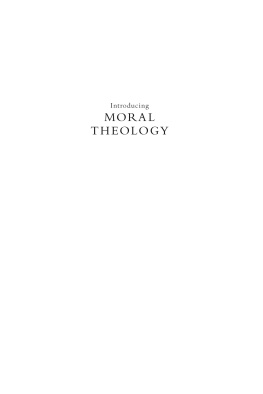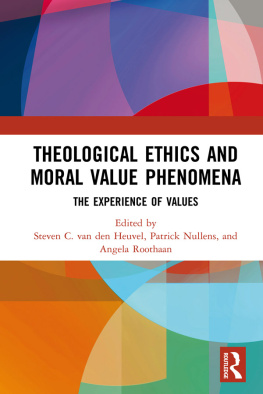CONTENTS
Introduction
18. Euthanasia: Test Case Four
G ratitude is a true privilege. We often speak of a debt of gratitude, and the debt of gratitude I owe for this work is enormous and widespread. But one of the points of this book is that living virtuously is life-giving for all involved. I can only hope that the following people have found the interactions which constitute their contribution to this book even a fraction as life-giving as they have been for me. It is a privilege to acknowledge my indebtedness in gratitude to the following.
I would first like to thank the students from my classes for whom this book was written, and who have shaped its entire content with their questions, contributions, and wonderful conversations. The book is truly the percolation of these classes and so would not be possible without the students. Many students were particularly generous in giving me explicit and written feedback on earlier versions of the text. With apologies to any I may have missed, special thanks to Alex Bautz, Liz Casey, Marian Cassilly, Mary Cohill, Mel Corley, Laura Davidson, Wil Donahue, Emily Dufficy, Rachel Dunphy, Mark Fellin, Ryan Frederickson, Philip Ilg, Rachel Jacobs, LeighAnne Kauffman, Peter Mercatanti, Kaylie Metz, Caitlin McKeon, Ellen Rawson, Dimitrie Samata, Emilee Senkevitch, J. Silverman, Lynne Simmons, and Kirsten Toth. Teaching assistants Matt Haven and Donna Moga also provided valuable feedback.
Many colleagues in the field of moral theology were generous in helping to shape the course out of which this book grows, and/or commenting on earlier versions of this text. Special thanks to David Cloutier, Tom Leininger, David McCarthy, John Grabowski, Bill Barbieri, and Jim Halstead. Friends at New Wine, New Wineskins, the annual symposium at Notre Dame for pre-tenure Catholic moral theologians, have also made important contributions in more ways than one. I cannot fail to mention the three mentors who have been so generous with me throughout my own formation in moral theology, and without whom I would never have been able to take on this project: Jean Porter, Servais Pinckaers, OP, and James F. Keenan, SJ. In terms of publishing and editing this book, Jeremy Langford and Rodney Clapp have been indispensable. I am grateful for their diligent work and especially for their friendship. Chris Blake and Mount St. Marys University generously provided grant money, in addition to a wonderfully hospitable intellectual environment, for the development of this book. Friends at Georgetown Universitys Office of Campus Ministry also provided a home in Healy Hall for the writing of this book. Finally on the professional side, it seems fitting to thank those whose work has been so formative on my teaching this course and thus writing this book. It is ludicrous to thank such cornerstones of the tradition as Augustine and Aquinas, and even those more recent intellectual giants such as Josef Pieper and C. S. Lewis who have gone before us. But it does seem appropriate to acknowledge contemporaries such as Robert Barron and Paul Wadell, whose works have been models of how to teach the riches of the Christian tradition to undergraduates in an accessible and attractive manner.
Lastly I would like to express my gratitude to those people who, while all intellectuals in the best sense of the word, have influenced me and therefore this work not primarily through their intellectual activity per se, but through the witness of their lives. My own vocation to study and teach moral theology has been born from the faith and love of these people who taught me through their examples how a life of virtue in Christ is indeed a truly fulfilling life. First mention must go to my wife Courtney who constantly teaches me about the virtuous life, in ways she does not describe with theological terminology but nonetheless speaks more vividly in her actions. Teachers and friends Stephen Balletta, SM, Otto Hentz, SJ, Timothy Scully, CSC, Sean McGraw, CSC, Lou Delfra, CSC, Brian Daley, SJ, and Cathy Kaveny have all helped teach me the content of this book with their lives and friendships, and for each of them I am eternally grateful.
Perhaps the best example from my own experience of people teaching with their lives has been that of my parents, Joan and Bill Mattison. With no theological training whatsoever, they are nonetheless the people in my life whose faith and love are so constitutive of who they are that they taught me more than anyone what it means to live a life of Christian virtue. In more ways that I can mention here or even perhaps recount, I owe the good things of my life to them. And thus it is to them that this book, a small token the life they have borne in me, is dedicated.
I wrote this book as an exercise in hospitality. With it I invite readers into a conversation on the basic human question, what is a good life? The book strives for an intentionally welcoming tone in two ways. First of all, a good host listens to his or her guests and appreciates wherever they are in their lives. This book grew out of just such listening to over five hundred students in twenty course sections over six years at four American universities (University of Notre Dame, Mount St. Marys University, Catholic University, and Georgetown University). It has grown and developed dramatically such that the present book, which follows this courses most recent version, is radically different from its first presentation to the students who took it and helped shape it. Its overall structure, the layout of individual chapters, and certain distinct points echo specific contributions of particular students over these past few years. It is born out of a conversation, and so its tone is one of walking with, rather than preaching at.
Second, a welcoming host does not simply listen, but also offers and contributes. By arranging space and furniture in a certain way, offering food and drink, and joining in conversation, a good host nourishes whatever venture he or she shares with the guests, be it the enjoyment of friendship, a better understanding of themselves and the world, support in times of trial, a common cause to make changes in the world, or all of these together. In this book I attempt to make a contribution to that ultimate adventure shared by readers and myself, that of understanding and living a good life. I offer my own experience (as a teacher), but more importantly sharein an accessible and relevant way the wisdom of smart and holy people who have gone before us on this common quest. The manner this is done in is not a simple presentation of information. It is rather adding voices to our conversation, a conversation that includes renowned thinkers, but as importantly the voices of us today who enjoy reflecting on and struggling with the question, what is a good life? I hope readers will join with me and past students in building a habit of reflection on this question as one component of the answer to that question.
Speaking of answers, this book is not a manual offering technical procedures and solutions to how to live a good life. This is largely due to that fact that this ultimate question defies technical solutions. It should not be placed in the how-to section of a bookstore next to books on home repair or writing a good resume. That is not to say there are no answers, or that this book makes no contribution to such answers. Given the nature and complexity of the question, no short synopsis is offered here by way of conclusion. Yet before proceeding to describe more specifically the goals and format of this book, allow me to note two foundational ideas of the books response to this question.
First, simply put, the answer to the question of what constitutes a good life is happiness. A good life is a fulfilling, satisfying, rewarding, flourishingin short, a happylife. This may seem so obvious as to be no answer at all. But recall this is a book on moral theology. The word moral has not yet appeared in this introduction. Some people may connect morality with living a good life. But morality as being happy? That is exactly the contention of this book. It is by no means an innovative contribution of this particular book. Great thinkers throughout historyChristian and non-Christian alikehave understood the moral life to be one and the same as the happy life, even if this claim does not initially resonate with what many of us today think of when we say morality. We see already the benefit of inviting those historic voices into our conversation. A main claim of this book is that it makes no sense to say, this will make you truly happy, but the morally right thing to do is something else. There are plenty of obstacles to happiness in this life, but morality rightly understood is not one of them. This point is not uncontested. As seen in chapter 1, some people today and throughout history have not understood morality as constitutive of living happy lives. Nonetheless, one central idea of this book is that determining how to live morally is a matter of determining how to be genuinely happy.
Next page



